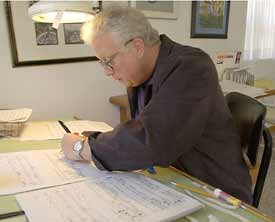
This web page is part of the Michigan Today Archive. To see this story in its original context, click here. |
|||||||
Music professor spends the year in the spotlightBy Michelle Begnoche University Record Intern Keeping up with the beat of his own success has proven to be a demanding task for William Bolcom in recent months. Bolcom, the Ross Lee Finney Distinguished Professor of Composition at the School of Music, watched his work "A View From a Bridge" performed by the New York Metropolitan Opera in December. "Ragomania: A Classical Overture for Orchestra" was performed by the New York Philharmonic Orchestra in January, and his monodrama "Medusa" was performed by Catherine Malfitano, a soprano known throughout the world, and the Stuttgart Chamber Orchestra at Carnegie Hall in March.
The year also held four world premieres for Bolcom, including "Symphony No. 7," commissioned by the Met Orchestra and performed in May 2002. Forthcoming works include an opera titled "The Wedding," based on the movie by Robert Altman, at the Lyric Opera of Chicago slated for Dec. 2004, and Bolcom's three-hour magnum opus "Songs of Innocence and of Experience," based on the poems of William Blake, which will be at Hill Auditorium in April 2004. This whirlwind schedule is not normal, Bolcom says. "It just happened that they all fell at the same time," he says. While he is humble about his success, Bolcom admits a sense of satisfaction. "I think this is as good as it is going to get, to have the best organizations play your music." Bolcom says his source of inspiration is a mystery. "When ideas surface, something is going on at a subconscious level that I am not aware of. They are like bulbs that come up as tulips," he says of the process. Although he may not know where his ideas come from, Bolcom knows how to keep them flowing: by working constantly. To accomplish this, he often works on several pieces simultaneously. In order to nurture his bulbs into flowers, Bolcom spends time sketching possibilities for the composition while focusing on other works further along in the process. From these sketches Bolcom eventually determines the first page of the composition. This is vital, he says. "You have to have a beginning because then you can go to the end. I don't like the idea of patching it together like a mosaic." Bolcom's favorite compositions are those he does for acquaintances. "The best is to write for people you know because I can put a portrait of them in the middle of the piece," he says. For example, "Medusa" was written for Malfitano. "'Medusa' was tailored to her strengths. I knew all the things she could do," Bolcom says. "I have been really lucky with my performers. I have had the cream of the crop." Bolcom has enjoyed a long career in music, entering the University of Washington at age 11, studying composition and piano, and earning his B.A. in 1958. Further studies followed at Mills College in California, the Conservatoire de Musique in Paris, and at Stanford University, where he completed his doctorate in composition in 1964. He began teaching at U-M in 1973 and has been chair of the Composition Department since 1998. Throughout his career in music he has won many awards, including the Pulitzer Prize for music in 1988 and the Governor's Art Award from the state of Michigan. Bolcom hesitates to label his music as classical. "There are all forms of music," he says. "The great classical masters have a variety of forms," he says, and he is simply adding more forms to the genre. Bolcom appreciates and learns from this broad spectrum of composers, ranging from The Beatles to Beethoven. "Some I love, some I just respect," he says. "I don't have any particular favorites." But when Bolcom wants to be immersed in the emotional outpourings music can inspire, he puts on Beethoven's late quartets. "I have to put everything down and just concentrate," he says. "It is almost like a religious experience." |
|||||||
| Michigan Today News-e is a new, monthly electronic publication for alumni and friends. |
| MToday News-e | |
|
| Book of the Month | |||||||
|
Michigan Today
online alumni magazine
University Record
faculty & staff newspaper
MGoBlue
athletics
News Service
University of Michigan
gateway
| Site of the Month | |||||||
|
|
• Maps |



